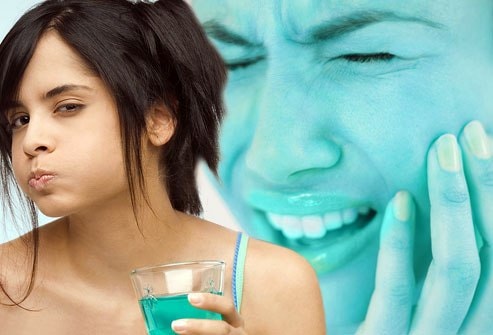Mouthwash abuse causes tooth decay
Mouthwash, if used incorrectly, will be wasteful and have a negative impact on oral health.
Lured by the lure of minty breath and the promise of fresh, clean teeth, mouthwashes have exploded in popularity in recent years. About 55% of the public now use mouthwash, up from 40% in 2006, according to researchers Mintel.
Gum disease starts with plaque. Bacteria that build up on teeth and aren't removed by brushing can damage the gums, causing bleeding and tooth decay. Mouthwashes can help. A study published in the Journal of Clinical Dentistry earlier this year found that using an antiseptic mouthwash twice a day reduced plaque buildup and gingivitis over six months.
However, there are many different opinions about the benefits of using mouthwash.
 |
Improper use of mouthwash causes waste and reduces the quality of oral hygiene. Photo: webmd |
"There is some evidence that mouthwashes are beneficial in reducing plaque levels. However, they are not a substitute for a toothbrush in keeping teeth and gums clean," said Professor Damien Walmsley, scientific adviser to the British Dental Association.
Many other experts say that spending money on mouthwash is unnecessary.
"If you brush properly, floss properly, have low levels of tooth decay, and don't have dental problems like bad breath, using mouthwash is a waste," says dentist Dr. Phil Stemmer.
The problem is that many people think that just using mouthwash is enough and do not pay attention to brushing their teeth properly. According to Dr. Sally Goss, of Harley Street Studio Dental Center, dental plaque is actually very solid and can only be removed by brushing or flossing. Mouthwash is not a good substitute for brushing.
“If used incorrectly, mouthwash can even reduce the effectiveness of toothpaste. Sometimes there can be an interaction between the chemicals in toothpaste and the chemicals in mouthwash, causing them to cancel out each other’s benefits,” says Dr. Stemmer.
It is important to maintain a gap between brushing and using mouthwash. "Toothpaste containing fluoride helps strengthen teeth. Therefore, maintaining a residue of toothpaste containing this substance for a long time will help strengthen teeth," shared Dr. Sally Goss.
Sally Goss suggests using mouthwash at lunchtime to avoid counteracting the benefits of toothpaste. Cleaning away food debris from lunch can help reduce tooth decay.
A common mistake is not rinsing long enough. "Almost all mouthwashes recommend that people gargle for about a minute before spitting it out. However, many people gargle for less time, they cannot get the full effect of the product, which is a waste," Sally Goss shared.
According to Dr. Stemmer, about 85% of people use mouthwash because they have bad breath. Although mouthwash is better than toothpaste for bad breath because the ingredients are easier to penetrate all the nooks and crannies in the mouth. However, mouthwash will not cure bad breath, it will only have a temporary effect in the short term. "To treat bad breath, you need the help of a dentist to locate the areas where bacteria may be hiding and thoroughly address them," Dr. Stemmer emphasized.
Mouthwashes come in many different forms. The most common ones contain alcohol (21-26%). Alcohol often helps the antibacterial ingredients work more effectively. However, according to a previous study, this type of mouthwash has been linked to oral cancer.
Some other types do not contain alcohol, instead using other antibacterial agents such as cetylpyridinium chloride, essential oils... For gum disease that occurs when plaque builds up around the gums, mouthwashes containing chlorhexidine should be used. This substance attacks bacteria and creates a protective shield against plaque buildup.
According to VnExpress - NT






